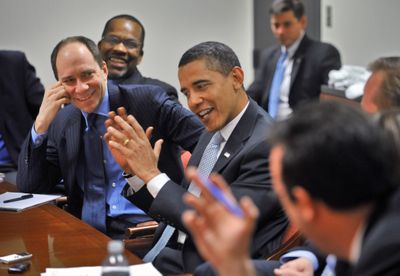Obama promises reform of entitlement programs

WASHINGTON – President-elect Barack Obama pledged Thursday to shape a new Social Security and Medicare “bargain” with the American people, saying that the nation’s long-term economic recovery cannot be attained unless the government finally gets control over its most costly entitlement programs.
That discussion will begin next month, Obama said, when he convenes a “fiscal responsibility summit” before delivering his first budget to Congress. He said his administration will begin confronting the issues of entitlement reform and long-term budget deficits soon after it jump-starts job growth and the stock market.
“What we have done is kicked this can down the road. We are now at the end of the road and are not in a position to kick it any further,” he said.
“We have to signal seriousness in this by making sure some of the hard decisions are made under my watch, not someone else’s.”
In a wide-ranging 70-minute interview with Washington Post reporters and editors, the president-elect pledged quick action on the Middle East once he takes office, promised to support voting rights for Washington, D.C., residents, and said he will consider it a failure if he has not closed the U.S. military prison at Guantanamo Bay, Cuba, by the end of his first term in office.
Obama is not the first incoming president to make bold declarations about overhauling the nation’s retirement and health care systems. Both Bill Clinton and George W. Bush made similar vows.
Clinton’s push for universal health care – led by his wife, Hillary Rodham Clinton – collapsed under opposition from insurance companies and leaders on Capitol Hill.
In 1993, Clinton appointed a commission on Medicare and Social Security headed by then-Sens. Bob Kerrey, D-Neb., and John Danforth, R-Mo., but never implemented its ambitious recommendations.
Bush made Social Security reform a centerpiece of his domestic agenda in his second term and, like Obama, pledged to expend political capital on the issue. He recently cited his failed push to allow some younger workers to invest their Social Security money in the stock market as one of the regrets of his presidency.
Five days before taking office, Obama was careful not to outline specific fixes for Social Security and Medicare, refusing to endorse either a new blue ribbon commission or the concept of submitting an overhaul plan to Congress that would be subject only to an up-or-down vote, similar to the one used to reach agreement on the closure of military bases.
But the president-elect exuded confidence that his economic team will succeed where others have not.
“Social Security, we can solve,” he said, waving his left hand. “The big problem is Medicare, which is unsustainable. … We can’t solve Medicare in isolation from the broader problems of the health care system.”
Medicare, the government health program for retirees and the disabled, is projected to be insolvent by 2019, according to the most recent report by the Social Security and Medicare trustees. Over the next two decades, Medicare spending is expected to double, consuming nearly one-quarter of the federal budget.
Beginning in 2011, Social Security will take in less revenue than it pays out and will be forced to dip into reserves to pay benefits. It is projected to deplete its reserves by 2041, according to the trustees.